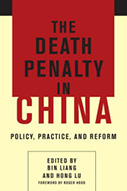The Death Penalty in China: Policy, Practice, and Reform

Editors: Bin Liang and Hong Lu
Publisher: New York: Columbia University Press, 2016. 362p.
Reviewer: Stephen Noakes | May 2017
As a student of global advocacy movements, I’m most often struck by the moral dimension of research on capital punishment. Such is the case with Bin Liang and Hong Lu’s new volume, which is a useful exercise in taking stock of reforms to the policy and practice of the death penalty in China, a country which has undergone radical economic, social and legal reform in recent years. The foreword, penned by famed Oxford death penalty scholar Roger Hood, conveys the sense that there has not only been significant change to the use of capital punishment in China, but that such changes are important milestones on the road to China’s eventual abolition of the death penalty. Referencing the 2005 experience of a conference of academics and lawyers at Renmin University, he writes that “the agenda was no longer, ‘should China abolish the death penalty?’ but rather ‘how can China move forward to abolish the death penalty?’” This sense of optimism, of progress down the track toward abolition of capital punishment in China, permeates the book as a whole.
The book is the first English-language edited collection on China’s death penalty, and contains contributions from both Chinese and Western(ized) scholars. There are, of course, a range of monographs and scholarly articles containing in-depth examinations of many of the subjects covered by contributors to this volume. However, research on Chinese politics and society, including criminal justice, is something of a moving target—the pace of change within the country is so rapid that academic books struggle to keep pace. Few studies are as up-to-the-minute in their assessment of changes since 2010, and in particular since the rise of Xi Jinping and the prioritization of rule of law development following the Third Plenum Decision of 2013.
The opening chapter examines reforms in China’s death penalty practices through domestic and international lenses, making clear that great strides have been made toward the more restrained use of the death penalty within China, and greater awareness of China’s death penalty practices abroad, even as information regarding the number of executions conducted in China remains secret. Susan Trevaskes highlights the shift from “killing many” to “killing few,” in which the state has attempted to strike a balance between leniency and severity in the application of the death penalty. Moulin Xiong considers the implications of restoring centralized review of capital cases, and Xingliang Chen outlines the emergence of guiding cases, which provide important precedents for more restrained use of the death penalty. At the same time, contributions from Ning Zhang, Yunhai Wang, and Zhigang Yu all place China’s death penalty in historical and cultural context, noting not only the uses of the death penalty for political purposes after the 1949 revolution, but its prevalence under the Nationalist and Qing governments as well. Shanhe Jiang and Hualing Fu both consider the role of popular sentiment in China’s death penalty system. Jiang’s piece provides an overview of the range of scholarly attempts to measure public opinion on the death penalty, and yields two interesting findings—first, the level of popular support for capital punishment varied widely, from 58-97 percent, and second, college students were less supportive of the death penalty than criminal justice professionals, who are often cited as a main force behind efforts to abolish capital punishment. Fu’s piece is similarly enlightening, as it demonstrates the ways in which China’s court system is deferent and defiant of public opinion, rather than wholly driven by popular opinion or CCP interests.
In sum, Bin Liang and Hong Lu have crafted a very welcome update to our store of knowledge about China’s death penalty, one that does a fine job of demonstrating just how far capital punishment reforms have come. The book is an excellent source of quick and up-to-date reference material for scholars of death penalty institutions in China, and criminal justice more broadly.
Stephen Noakes is Lecturer in Chinese Politics at the University of Auckland, New Zealand


